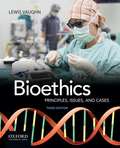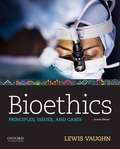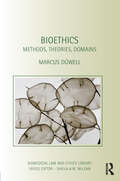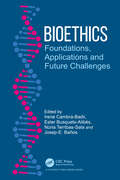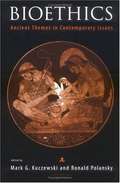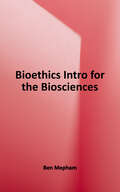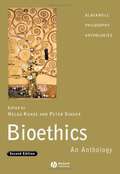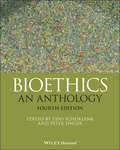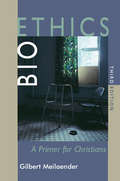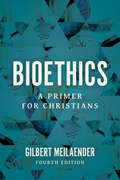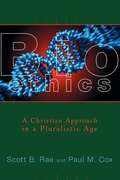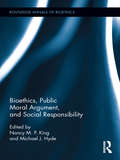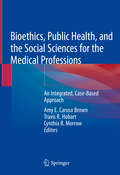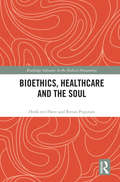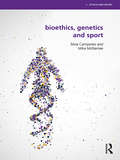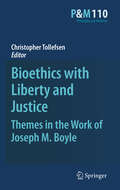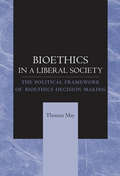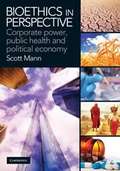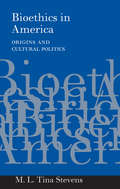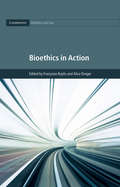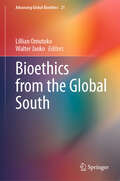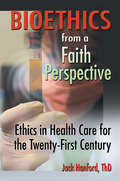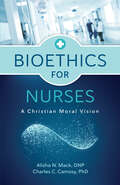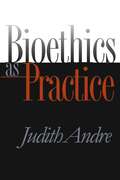- Table View
- List View
Bioethics: Principles, Issues, And Cases, Third Edition
by Lewis VaughnBioethics: Principles, Issues, and Cases, Third Edition, explores the philosophical, medical, social, and legal aspects of key bioethical issues. Opening with a thorough introduction to ethics, bioethics, and moral reasoning, it then covers influential moral theories and the criteria forevaluating them. Integrating eighty-nine readings - twelve of them new to this edition - numerous classic bioethical cases, and abundant pedagogical tools, this text addresses the most provocative and controversial topics in bioethics. PEDAGOGICAL FEATURES:* "Classic Case Files" describe landmark cases that shaped the debate, while news-making "Cases for Evaluation" encourage students to form their own opinions* Various text boxes: "In Depth" boxes contain additional material, illustrations, or analyses, much of it "ripped from the headlines"; "Fact File" boxes provide statistics on the social, medical, and scientific facets of a chapter's topic; and "Legal Brief" boxes summarize important court rulingsand the status of major legislation* "Key Terms" are boldfaced and boxed off within the text and then defined in a glossary at the back of the book* "Applying Major Theories" sections at the end of each chapter help students relate theories to the issues
Bioethics: Principles, Issues, And Cases
by Lewis VaughnThis book explores the philosophical, medical, social, and legal aspects of key bioethical issues. Opening with a thorough introduction to ethics, bioethics, and moral reasoning, it then covers influential moral theories and the criteria for evaluating them. Integrating eighty-seven readings--ten of them new to this edition--substantive introductions to each issue, numerous classic bioethical cases, and abundant pedagogical tools, this text addresses the most provocative and controversial topics in bioethics.
Bioethics: Methods, Theories, Domains (Biomedical Law and Ethics Library)
by Marcus DüwellThis book is a philosophically-oriented introduction to bioethics. It offers the reader an overview of key debates in bioethics relevant to various areas including; organ retrieval, stem cell research, justice in healthcare and issues in environmental ethics, including issues surrounding food and agriculture. The book also seeks to go beyond simply describing the issues in order to provide the reader with the methodological and theoretical tools for a more comprehensive understanding of current bioethical debates. The aim of the book is to present bioethics as an interdisciplinary field, to explore its close relation to other disciplines (such as law, life sciences, theology and philosophy), and to discuss the conditions under which bioethics can serve as an academically legitimate discipline that is at the same time relevant to society. As a systematic and methodologically rigorous overview, Bioethics: Methods, Theories and Principles will be of particular interest to academics and students in the disciplines of Law, Medicine, Ethics and Philosophy. 'This is a book that embraces neither a single ethical theory nor a pragmatic melange of just-so-principles. It is a thoughtful and engaging analysis of diverse theoretical foundations in Bioethics. It is also an enormous step towards conceptual and philosophical clarity in this fascinating area.' - Professor Christian Illies, Chair for Practical Philosophy at the Otto-Friedrich University Bamberg, Germany
Bioethics: Foundations, Applications and Future Challenges
by Irene Cambra-Badii Ester Busquets-Alibés Terribas-Sala Núria Josep-E. BañosThe aim of this book is to introduce and discuss bioethics in a three-synergistic way: from the foundations to the current debates in relation to healthcare and social bioethics, and thereafter the possible future challenges. In this sense, the target audience can be from diverse disciplines: life and medical sciences, law, philosophy, psychology, and education. The book will be useful to high school students, in their first contacts with bioethics, college students, teachers and researchers, and the general public interested in these controversial debates of the past, present and future of bioethics.
Bioethics: Ancient Themes in Contemporary Issues
by Mark G. Kuczewski Ronald M. PolanskyThis collection of essays explores themes from ancient Greek philosophy and medicine and their implications for contemporary medicine and bio-medical ethics. Thus the work examines the relationship of two of the most popular areas in the current revival of ethics, namely, classical ethics and biomedical ethics--areas that have seldom been brought together in any serious or sustained way. The essays in this volume are written by established classical scholars and bioethicists.
Bioethics: An Introduction for the Biosciences
by Ben MephamBioethical issues remain front-page news, with debate continuing to rage over issues including genetic modification, animal cloning, and 'designer babies'. With public opinion often driven by media speculation, how can we ensure that informed decisions regarding key bioethical issues are made in a reasoned, objective way? Bioethics: An Introduction for the Biosciences offers a balanced, objective introduction to the field of bioethics, ideal for any biosciences student who is new to the subject. With a focus on developing the students' power of reasoning and judgement, the book presents different perspectives to common themes in an impartial way, fostering debate and discussion. The opening section, 'The Ethical Groundwork', introduces students to the nature of bioethics and ethical theory. The book goes on to lead students through a broad range of bioethical issues relating to people, animals, and food, before concluding with an overview of bioethics in practice. The current generation of students will become the next generation of decision makers. Bioethics: An Introduction for the Biosciences is the perfect introduction to a field with which every biosciences student should be familiar. Online Resource Centre The Online Resource Centre features: For registered adopters of the book: - Figures from the book in electronic format, ready to download For students: - A web link library and hyperlinked reference list, giving ready access to additional information sources; - Topical updates: extensive summaries of the latest developments in those topics covered in the book, ensuring that the reader can remain up-to-date at all times.
Bioethics: An Anthology (Second Edition)
by Peter Singer Helga KuhseThe expanded and revised edition of Bioethics: An Anthology is a definitive one-volume collection of key primary texts for the study of bioethics. Brings together writings on a broad range of ethical issues relating such matters as reproduction, genetics, life and death, and animal experimentation. Now includes introductions to each of the sections. Features new coverage of the latest debates on hot topics such as genetic screening, the use of embryonic human stem cells, and resource allocation between patients. The selections are independent of any particular approach to bioethics. Can be used as a source book to complement A Companion to Bioethics (1999).
Bioethics: An Anthology (Blackwell Philosophy Anthologies #27)
by Peter Singer Udo Sch KlenkThe new edition of the classic collection of key readings in bioethics, fully updated to reflect the latest developments and main issues in the field For more than two decades, Bioethics: An Anthology has been widely regarded as the definitive single-volume compendium of seminal readings on both traditional and cutting-edge ethical issues in biology and medicine. Acclaimed for its scope and depth of coverage, this landmark work brings together compelling writings by internationally-renowned bioethicist to help readers develop a thorough understanding of the central ideas, critical issues, and current debate in the field. Now fully revised and updated, the fourth edition contains a wealth of new content on ethical questions and controversies related to the COVID-19 pandemic, advances in CRISPR gene editing technology, physician-assisted death, public health and vaccinations, transgender children, medical aid in dying, the morality of ending the lives of newborns, and much more. Throughout the new edition, carefully selected essays explore a wide range of topics and offer diverse perspectives that underscore the interdisciplinary nature of bioethical study. Edited by two of the field’s most respected scholars, Bioethics: An Anthology: Covers an unparalleled range of thematically-organized topics in a single volume Discusses recent high-profile cases, debates, and ethical issues Features three brand-new sections: Conscientious Objection, Academic Freedom and Research, and Disability Contains new essays on topics such as brain death, life and death decisions for the critically ill, experiments on humans and animals, neuroethics, and the use of drugs to ease the pain of unrequited love Includes a detailed index that allows the reader to easily find terms and topics of interest Bioethics: An Anthology, Fourth Edition remains a must-have resource for all students, lecturers, and researchers studying the ethical implications of the health-related life sciences, and an invaluable reference for doctors, nurses, and other professionals working in health care and the biomedical sciences.
Bioethics: A Primer for Christians, Third Edition
by Gilbert MeilaenderIn the face of continuing advances in medical research and treatment, bioethics remains a serious ongoing social concern. For nearly two decades Gilbert Meilaender’s Bioethics has offered discerning Christian guidance on a wide range of pressing issues in medical ethics. Now in its third edition, Meilaender’s Bioethics covers abortion, assisted reproduction, genetic research, suicide and euthanasia, human experimentation — and much more — in language that is theologically informed, straightforward, and clear. This new edition includes updated information throughout and an added discussion of the need to protect Christian conscience in the practice of medicine.
Bioethics: A Primer for Christians
by Gilbert MeilaenderAmid continuing advances in medical research and treatment, Gilbert Meilaender&’s Bioethics has long provided thoughtful guidance on many of society&’s most difficult moral problems—including abortion, assisted reproduction, genetic experimentation, euthanasia, and much more. In this fourth edition, Meilaender updates much of the data referenced in the book and responds directly to recent developments, such as the CRISPR/Cas9 method of gene editing. Christians seeking discernment in this new decade will appreciate Meilaender&’s circumspect writing and his ability to address the nuances of each issue while maintaining strong and clearly stated moral convictions.
Bioethics: A Christian Approach in a Pluralistic Age
by Scott B. Rae Paul M. CoxThe authors assess various secular approaches to bioethics that are particularly influential today and develop a framework for a Christian approach to assist people in addressing the many pressing issues in the field. Throughout, the authors touch on the numerous debated issues in bioethics though they are primarily concerned to give an account of the central theological notions crucial to an informed Christian perspective on bioethics.
Bioethics, Public Moral Argument, and Social Responsibility (Routledge Annals of Bioethics)
by Nancy M. P. King Michael J. HydeBioethics, Public Moral Argument, and Social Responsibility explores the role of democratically oriented argument in promoting public understanding and discussion of the benefits and burdens of biotechnological progress. The contributors examine moral and policy controversies surrounding biomedical technologies and their place in American society, beginning with an examination of discourse and moral authority in democracy, and addressing a set of issues that include: dignity in health care; the social responsibilities of scientists, journalists, and scholars; and the language of genetics and moral responsibility.
Bioethics, Public Health, and the Social Sciences for the Medical Professions: An Integrated, Case-Based Approach
by Amy E. Caruso Brown Travis R. Hobart Cynthia B. MorrowThis unique textbook utilizes an integrated, case-based approach to explore how the domains of bioethics, public health and the social sciences impact individual patients and populations. It provides a structured framework suitable for both educators (including course directors and others engaged in curricular design) and for medical and health professions students to use in classroom settings across a range of clinical areas and allied health professions and for independent study.The textbook opens with an introduction, describing the intersection of ethics and public health in clinical practice and the six key themes that inform the book's core learning objectives, followed by a guide to using the book. It then presents 22 case studies that address a broad spectrum of patient populations, clinical settings, and disease pathologies. Each pair of cases shares a core concept in bioethics or public health, from community perspectives and end-of-life care to medical mistakes and stigma and marginalization. They engage learners in rigorous clinical and ethical reasoning by prompting readers to make choices based on available information and then providing additional information to challenge assumptions, simulating clinical decision-making. In addition to providing a unique, detailed clinical scenario, each case is presented in a consistent format, which includes learning objectives, questions and responses for self-directed learning, questions and responses for group discussion, references, and suggested further reading. All cases integrate the six themes of patient- and family-centered care; evidence-based practice; structural competency; biases in decision-making; cultural humility and awareness of the culture of medicine; and justice, social responsibility and advocacy. The final section discusses some challenges to evaluating courses and learning encounters that adopt the cases and includes a model framework for learner assessment.
Bioethics, Medicine and the Criminal Law
by Suzanne Ost Margaret BrazierThrough socio-legal, theoretical, comparative and historical analysis, case studies and empirical research, this three-volume set offers balanced arguments which help the reader form a reasoned view on the ethical legitimacy of the invocation and use of criminal law to regulate medical practice and bioethical issues. To date, little analysis exists of the criminal process's role in regulating medical practice, its role as an arbiter of bioethics, or its ability to serve as an appropriate forum for judging ethical medical dilemmas. The books analyse how effectively the criminal law can and does operate as a forum for resolving ethical conflict in the contexts of health care, scientific research and biotechnologies. Key questions that are addressed include: how does criminal law regulate controversial bioethical areas? What effect does the use of criminal law have when regulating bioethical conflict? Can the law accommodate moral controversy? And are bioethics and criminal law compatible?
Bioethics, Healthcare and the Soul (Routledge Advances in the Medical Humanities)
by Henk ten Have Renzo PegoraroThis thought-provoking book explores the connections between health, ethics, and soul. It analyzes how and why the soul has been lost from scientific discourses, healthcare practices, and ethical discussions, presenting suggestions for change. Arguing that the dominant scientific worldview has eradicated talk about the soul and presents an objective and technical approach to human life and its vulnerabilities, Ten Have and Pegoraro look to rediscover identity, humanity, and meaning in healthcare and bioethics. Taking a mulitidisciplinary approach, they investigate philosophical, scientific, historical, cultural, social, religious, economic, and environmental perspectives as they journey toward a new, global bioethics, emphasizing the role of the moral imagination. Bioethics, Healthcare and the Soul is an important read for students, researchers, and practitioners interested in bioethics and person-centred healthcare.
Bioethics, Genetics and Sport (Ethics and Sport)
by Silvia Camporesi Mike McNameeAdvances in genetics and related biotechnologies are having a profound effect on sport, raising important ethical questions about the limits and possibilities of the human body. Drawing on real case studies and grounded in rigorous scientific evidence, this book offers an ethical critique of current practices and explores the intersection of genetics, ethics and sport. Written by two of the world's leading authorities on the ethics of biotechnology in sport, the book addresses the philosophical implications of the latest scientific developments and technological data. Distinguishing fact from popular myth and science fiction, it covers key topics such as the genetic basis of sport performance and the role of genetic testing in talent identification and development. Its ten chapters discuss current debates surrounding issues such as the shifting relationship between genetics, sports medicine and sports science, gene enhancement, gene transfer technology, doping and disability sport. The first book to be published on this important subject in more than a decade, this is fascinating reading for anyone with an interest in the ethics of sport, bioethics or sport performance.
Bioethics with Liberty and Justice: Themes in the Work of Joseph M. Boyle (Philosophy and Medicine #110)
by Christopher TollefsenJoseph M. Boyle Jr. has been a major contributor to the development of Catholic bioethics over the past thirty five years. Boyle's contribution has had an impact on philosophers, theologians, and medical practitioners, and his work has in many ways come to be synonymous with analytically rigorous philosophical bioethics done in the Catholic intellectual tradition. Four main themes stand out as central to Boyle's contribution: the sanctity of life and bioethics: Boyle has elaborated a view of the ethics of killing at odds with central tenets of the euthanasia mentality, double effect and bioethics: Boyle is among the pre-eminent defenders of a role for double effect in medical decision making and morality, the right to health care: Boyle has moved beyond the rhetoric of social justice to provide a natural law grounding for a political right to health care; and the role of natural law and the natural law tradition in bioethics: Boyle's arguments have been grounded in a particularly fruitful approach to natural law ethics, the so-called New Natural Law theory. The contributors to BIOETHICS WITH LIBERTY AND JUSTICE: THEMES IN THE WORK OF JOSEPH M. BOYLE discuss, criticize, and in many cases extend the Boyle's advances in these areas with rigor and sophistication. It will be of interest to Catholic and philosophical bioethicists alike.
Bioethics in a Liberal Society: The Political Framework of Bioethics Decision Making
by Thomas MayIssues concerning patients' rights are at the center of bioethics, but the political basis for these rights has rarely been examined. In Bioethics in a Liberal Society: The Political Framework of Bioethics Decision Making, Thomas May offers a compelling analysis of how the political context of liberal constitutional democracy shapes the rights and obligations of both patients and health care professionals. May focuses on how a key feature of liberal society—namely, an individual's right to make independent decisions—has an impact on the most important relational facets of health care, such as patients' autonomy and professionals' rights of conscience.Although a liberal political framework protects individual judgments, May asserts that this right is based on the assumption of an individual's competency to make sound decisions. May uses case studies to examine society's approach to medical decision making when, for reasons ranging from age to severe mental disorder, a person lacks sufficient competency to make independent and fully informed choices. To protect the autonomy of these vulnerable patients, May emphasizes the need for health care ethics committees and ethics consultants to help guide the decision-making process in clinical settings. Bioethics in a Liberal Society is essential reading for all those interested in understanding how bioethics is practiced within our society.
Bioethics in Perspective
by Scott MannIn Bioethics in Perspective Scott Mann demonstrates the importance of issues of corporate power, global inequality and sustainability in shaping health outcomes around the world. The text develops a comprehensive ethical and practical critique of the neoliberal economic ideas which have guided policy in the English-speaking world. It explores the consequences of such policies for health and healthcare around the world, in terms of increasing health inequalities, serious food and water shortages, inadequate health care provision and the marketing of dangerous and unnecessary drugs. With clear proposals for political and economic reform to effectively address these problems, Bioethics in Perspective provides an important counterbalance to much conventional commentary on bioethics. It takes readers with little or no prior knowledge of ethics, economics or medicine quickly and easily into advanced debates and discussions about the causes and consequences of health and illness around the world.
Bioethics in America: Origins and Cultural Politics
by M. L. StevensIn Bioethics in America, Tina Stevens challenges the view that the origins of the bioethics movement can be found in the 1960s, a decade mounting challenges to all variety of authority. Instead, Stevens sees bioethics as one more product of a "centuries-long cultural legacy of American ambivalence toward progress," and she finds its modern roots in the responsible science movement that emerged following detonation of the atomic bomb.Rather than challenging authority, she says, the bioethics movement was an aid to authority, in that it allowed medical doctors and researchers to proceed on course while bioethicists managed public fears about medicine's new technologies. That is, the public was reassured by bioethical oversight of biomedicine; in reality, however, bioethicists belonged to the same mainstream that produced the doctors and researchers whom the bioethicists were guiding.
Bioethics in Action (Cambridge Bioethics And Law)
by Françoise Baylis Alice DregerSpeaking from and to the growing movement among academics to become involved with 'socially-engaged' work, this volume presents first-person case studies of attempts to fix serious ethical problems in medical practice and research. It highlights the critical difference between the pundit approach to bioethics and the interventional approach - the talkers and the doers - and points to how abused and damaged the doers often end up.<P><P> Chapters cover a diverse set of topics, including the troubling influence of for-profit businesses on public health policy, the politics of exposing histories of unjust medical research, the challenges of patient rights' work in sexuality and reproduction, collaborations between NGOs and academics, methods for changing entrenched yet harmful medical practices, engaging public policy through educating governmental leaders, and whistleblowing. The trending interest in the interplay of academia and advocacy and the growing importance of 'socially-engaged' work by academics make this a timely and much-needed resource.<P> A much-needed resource for those working and teaching bioethics, health law, research integrity, research ethics, public policy, medical technology and pharmaceutical development, governmental affairs, the history and philosophy of science and medicine, journalism, media studies, and non-profit administration and advocacy.<P> Explores the relationships between: scholarship and advocacy; medical ethics and health law; medical care and medical research; public and private sectors; journalism and scholarship; and governmental and non-governmental actors.<P> Provides practical approaches and warnings about intervening in thorny ethical issues.<P>
Bioethics from the Global South (Advancing Global Bioethics #21)
by Lillian Omutoko Walter JaokoThis book tackles complex global issues like vaccination, climate change, environmental ethics, embryo adoption, and surrogate motherhood viewed from the perspective of the global south. The COVID-19 pandemic has emphasized the need for addressing bioethical issues on a global scale, beyond national and regional boundaries. Challenges highlighted in the book include cultural differences, multi-pluralism, insufficient funding, and limited opportunities for awareness and provision of education in global bioethics, particularly in low and middle-income countries. The book employs universal and global bioethics frameworks, referencing the Universal Declaration of Human Rights and the UNESCO Universal Declaration on Bioethics and Human Rights. These documents, along with other international agreements and national constitutions were used to advocate for human dignity, health, and fundamental freedoms. Contributions from authors in Kenya, Uganda, and Nigeria provide valuable perspectives, making this book a must-read for ethicists, bioethicists, medical students, and healthcare workers with an interest in global bioethics.
Bioethics from a Faith Perspective: Ethics in Health Care for the Twenty-First Century
by Harold G Koenig Jack T HanfordDiscover the spiritual community's position on bioethics issues!Bioethics from a Faith Perspective: Ethics in Health Care for the Twenty-First Century offers a meaningful, rational, faith-oriented framework for deciding how to deal with important biomedical health care issues. Organ donation, managed care, the Human Genome Project, and medical technology that keeps people alive beyond their “natural” life span are some of the topics it illuminates through case analysis and resolution. Since almost all textbooks in bioethics omit the religious dimension of life (even though the field was inspired and stimulated by religious scholars at Princeton and Yale), this is an indispensable volume.While most people state their moral positions from the background of their religious traditions, many have not had the opportunity to study the relation between their faith perspectives and the difficult issues that arise in the pursuit of health care. This book shows the relevance, significance, and guidance that a faith perspective can offer for dealing with bioethical issues.This unique and thoughtful book: shows you how to distinguish and describe the relation between technical and ethical aspects of health-related issues provides you with a framework of moral principles, theories, values, and faith viewpoints teaches you the defining characteristics of a moral professional-client relationship related to faith helps you to discern when medical ethics and faith commitments are therapeutic and when they are not gives examples describing a moral problem, a faith perspective, and a justified position on that problemSince bioethics has been an amazing story of growth from the 1950s to the present day and is still expanding, there will be changes. Bioethics from a Faith Perspective stimulates that expansion by including the religious dimension. It is the perfect supplement to the existing literature on the subject.
Bioethics for Nurses: A Christian Moral Vision
by Charles C. Camosy Alisha N. MackRecovering the foundation of faith in a profession enduring the pressures of a rapidly changing health-care system.If you are one of the millions of Christian nurses or nursing students in the United States, you already know that there is no real way to separate your faith commitments from your professional vocation—nor would you want to. Especially amid the bedlam of the COVID-19 pandemic, faith has given countless nurses the strength to carry on and be there for their patients, one exhausting shift after another.Bioethics for Nurses, the first book of its kind, is for nurses and nurses in training who still believe in treating the whole person—not just their medical condition. It is for those committed to living out the love of Jesus Christ through the warm, relational care they provide for all hurting and vulnerable people—including those in underserved populations—each of whom has the dignity of a human being made in the image of God. It is also for those who rightly see themselves as crucial members of medical teams alongside doctors (and sometimes without doctors present at all), empowered to exercise professional judgment while protecting their consciences.With the combined wisdom of Alisha Mack, a professor of nursing with many years of clinical experience, and Charles Camosy, an award-winning bioethicist and theologian, Bioethics for Nurses advances a vision for a holistic Christian notion of health care with practical applications for everyday relevance on the job. Through a series of case studies in the second part of the book, Mack and Camosy explore the ethics of specific situations with far-reaching implications for nurses working in a range of fields. In the last part, the authors reflect on the future of nursing after COVID-19, making this an especially timely book for a pivotal moment in the history of the profession. Now, more than ever before, the wisdom of the ancient tradition of Christianity is needed to speak into the profound contemporary realities we are facing together as a culture.
Bioethics as Practice
by Judith Andre<P>Those who work in bioethics and the medical humanities come from many different backgrounds, such as health care, philosophy, law, the social sciences, and religious studies. The work they do also varies widely: consulting on ethical issues in patient care, working with legislatures, dealing with the media, teaching, speaking, writing and more. <P>Writing as a participant in this developing field, Judith Andre offers a model to unify its diversity. Using the term "bioethics" broadly, to include all the medical humanities, she articulates ideals for the field, identifies its temptations and moral pitfalls, and argues for the central importance of certain virtues. Perhaps the most original of these is the virtue of choosing projects well, which demands not only broadening the field's focus but also understanding the forces that have kept it too narrow. Andre offers an imaginative analysis of the special problems presented by interdisciplinary work and discusses the intellectual virtues necessary for its success. She calls attention to the kinds of professional communities that are necessary to support good work. <P>The book draws from interviews with many people in the field and from the findings of social scientists. It includes the author's personal reflections, several extended allegories, and philosophical analysis. <P>Those who work in bioethics and the medical humanities come from many different backgrounds: health care, philosophy, law, social sciences, religious studies, and more. The work they do also varies widely. Writing as a participant in this developing field, Judith Andre offers a model to unify its diversity. Using the term "bioethics" broadly, to include all the medical humanities, she articulates ideals for the field, identifies its temptations and moral pitfalls, and argues for the central importance of certain virtues.-->
